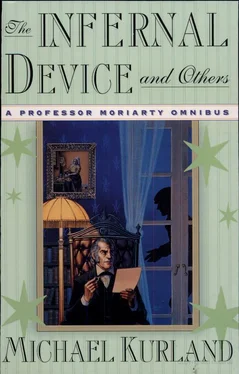"Not merely the Austrians," I said, putting the magazine down and reaching for the humidor on the mantel. "The whole medical world. But really, Moriarty, this is too much. Two hundred years ago they would have burned you at the stake as a sorcerer."
Moriarty leaned over and took a cigar from the humidor as I held it toward him. "After all the time we have been in association," he said, "surely you can follow my methods by now."
"It is one thing to watch from the audience as De Kolta vanishes a girl on stage," I told him, "quite another to know how the trick is done."
Moriarty smiled and rolled the cigar between his palms. "My 'tricks' are in one way quite like those of a stage conjurer," he said. "Once you know how they're done, they don't seem quite so miraculous." He paused to clip and pierce the ends of the cigar with his silver cigar cutter. Then he lit a taper from the gas mantle on the wall, and puffed the cigar to life. "But think back. This particular miracle should succumb even to your analysis."
I rose and went over to the sideboard to pour myself another cup of coffee. The serving girl had yet to clear away the dinner dishes, and I absently banged the coffee spoon against a wine glass that had recently held its share of a fine '63 Chateau de Braquenne Bordeaux. Some months ago Moriarty had cleared up a particularly delicate problem for Hamish Plummet, partner in Plummet & Rose, Wines and Spirits, Piccadilly. Plummet presented the professor with a case of that rare vintage as a token of his appreciation, and tonight Moriarty had uncorked a bottle and pronounced it excellent. I was pleased to agree.
"You read the article," I suggested.
"Bravo, Barnett," Moriarty said. "A capital start."
"And you saw me reading it. But wait — you were across the room, looking out the window."
"True," Moriarty acknowledged. "I saw you reflected in the window glass."
"Ah!" I said. "But how did you know which article — even if you saw me reading—"
"I did not merely see, I observed. You stared down at your free hand, turning it over and examining it in a contemplative manner."
"Did I?"
"You were reflecting on Semmelweis's campaign to get his fellow physicians to wash their hands before treating patients. You were no doubt thinking of how many poor women had died in childbirth because the doctors scorned him and refused to take his advice."
"That's so, I remember," I told him.
"Thus I knew, by observation, which article you were reading. And then you put down the magazine and shook your head, clearly revealing your sequence of thought, and I said what I said." Moriarty returned his gaze to the window and puffed silently on his cigar.
A few moments later Mr. Maws, Moriarty's butler, knocked at the door and entered, and the serving girl scurried in past him and started clearing the table. "There's a milord come to see you, Professor," he said. "I put him in the front room. Here's his lordship's card." Mr. Maws handed Moriarty the rectangular pasteboard.
Moriarty centered his cigar carefully on the lip of an oversized ashtray and looked at the card, and then looked again. He ran his fingers over the surface, and then reached for a glass of water on the table, using it as a magnifying glass to carefully study the printing on the card. "Fascinating," he said. "What does the milord look like?"
"Young," Mr. Maws pronounced. "His attire is a bit on the messy side."
"Ah!" Moriarty said. "Well, I'll see him in my office. Give us a few seconds to get settled, and then bring him along."
"Very good, Professor," Mr. Maws said, and he bowed slightly and backed out of the room.
"The nobility has a sobering effect on Mr. Maws," Moriarty commented, as we crossed the hall to the office.
"Who is it, Professor?" I asked. "A client?"
Moriarty passed me the card. "Certainly he desires to become one," he said. "Else why would he come calling at this time of night?"
I examined the card to see what had fascinated Moriarty. Printed on the face was: Lord Everett Tarns, and underneath that: Earl of Whitton. There was nothing else. "Then you don't know who he is?"
"No." Moriarty went to the bookshelf by his desk and reached for the copy of Burke's Peerage, then took his hand away. "And we don't have time to look him up, either, if those are his footsteps I hear."
I sat down on a chair by the window and awaited events.
A few seconds later a harried-looking man of thirty-five or so in a rumpled dark suit burst through the door and stared at both our faces before deciding which of us he had come to see. "Professor Moriarty," he said, addressing my companion, who had lowered himself into the massive leather chair behind his desk, "I am in the deepest trouble. You must help me!"
"Of course, your lordship. Sit down, compose yourself, and tell me your problem. I think you will find this chair by the desk comfortable."
His lordship dropped into the chair and looked from one to the other of us, his hands clasped tightly in front of him.
"This is Mr. Barnett, my confidant," Moriarty told the distraught lord. "Anything you choose to tell me will be safe with him."
"Yes, of course," Lord Tams said. "It's not that. Only — I'm not sure how to begin."
"Let me see if I can help," Moriarty said, leaning forward and resting his chin on his tented hands. His hawklike eyes looked Lord Tams over closely for a few seconds. "You are unmarried. Your older brother died unexpectedly quite recently, leaving you heir to the title and, presumably, estates of the Earldom of Whitton. Your new obligations make it necessary for you to give up your chosen profession of journalism, a result that is not altogether pleasing to you. You and your brother were not on the best of terms, although nothing irreconcilable had passed between you."
His lordship's hands dropped to his side and he stared at Moriarty. The professor has that effect on some people.
Moriarty sat up. "There are some other indications that are suggestive but not certain," he said. "As to the specific problem that brought you here, I'm afraid you'll have to tell me what it is."
"Who has spoken to you about me?" Lord Tams demanded.
"No one, your lordship, I assure you," Moriarty said. "You carry the indications about for the trained eye to read."
"Really?" Lord Tams rested one hand firmly on the edge of the desk and pointed an accusing finger at Moriarty with the other. "The death of my brother? The fact that I am unmarried — and a journalist? Come now, sir!"
Moriarty leaned forward, his eyes bright. "It is, after all, my profession, my lord," he said. "My ability to see what others cannot is, presumably, what brought you to me. Now, what is your problem?"
Lord Tams took a deep breath, or perhaps it was a sigh. "Your surmises are correct, Professor Moriarty," he said. "I am unmarried. My profession, if such I may call it, has been writing freelance articles on economic subjects for various London newspapers and magazines. When an editor wants a piece on free trade, or Serbian war reparations, he calls on me. I have recently — very recently — come into the title, inheriting it from my elder brother Vincent, who died suddenly. It is his death that has brought me here to seek your assistance."
I leaned forward in my chair. The thrill of being in at the beginning of one of Moriarty's little exercises does not diminish with time. "Your brother was murdered?" I asked.
"My brother's death was, and is, completely unexplainable, Mr. Barnett," Lord Tams replied.
Moriarty clapped his hands together. "Really?" he said. "Come, this is quite — interesting. Tell me everything you know of the affair."
"The circumstances are simple. Vincent had gone to one of his clubs — the Paradol in Montague Street — to stay for a few days. On the morning of the third day a waiter went in to bring Vincent his breakfast, which he had ordered the night before, and found my brother dead in his bed. He was lying on his back, his face and chest unnaturally red, his hands were raised as if to ward off some unseen threat, and a look of terror was fixed on his face. The club doctor, a Dr. Papoli, examined him and said it was apoplexy; but, as the doctor is from somewhere in the Balkans, and lacks a British medical degree, nobody seemed to take him too seriously. The police doctor strongly disagreed, although he could not come up with an alternate diagnosis."
Читать дальше












